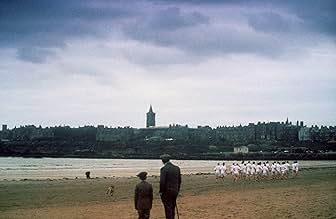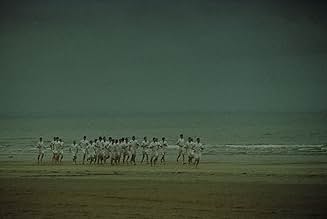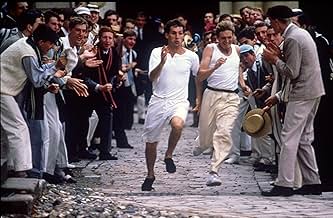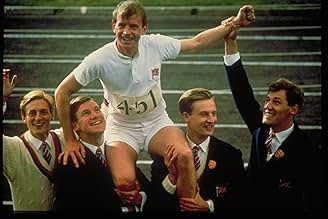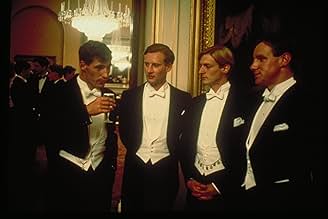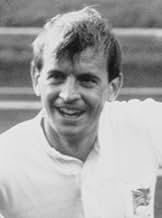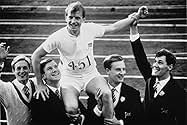NOTE IMDb
7,1/10
69 k
MA NOTE
Deux athlètes britanniques, le premier juif convaincu et le second un chrétien dévot, participent aux Jeux olympiques de 1924.Deux athlètes britanniques, le premier juif convaincu et le second un chrétien dévot, participent aux Jeux olympiques de 1924.Deux athlètes britanniques, le premier juif convaincu et le second un chrétien dévot, participent aux Jeux olympiques de 1924.
- Récompensé par 4 Oscars
- 18 victoires et 19 nominations au total
John Gielgud
- Master of Trinity
- (as Sir John Gielgud)
Avis à la une
On a basic level it is the ultimate British Oscar-winning period piece and influential, uplifting feel-good film. Its two chief qualities are its subsequently strong realism and the resonant Vangelis soundtrack that, as with 'Blade Runner', increases the strength and significance of scenes through sound. Although it has a specific setting or historical background, the music adds an appropriate timelessness to the powerfully relevant human themes. These include winning and losing, of having what it takes to run the race, and of the old gentlemanly values of religion, decency and personal honour. It is the determining of the self, the inner strength, by understanding and will. The real-life characters and events are brought to life with the engaging realization that a climax will arrive at the end. At its core is a rivalry, less of a personal one and more the dilemma of two men wanting to win the same race. However, the climax is not predictable for such a straight-forward competition cannot occur. That is to say, they are both dedicated and honest men, with completely different religions, and it is this combination of resolution and talent which enables them both to win their own race. Around this central thread of training and determination, the film-makers have recreated the world surrounding these university characters in the 1920s. Scenes are filled with the casual, graceful attitudes that are a very British ideal; sophisticated prowess, decency, honesty, religion and intellect, values which seem to be less respected in this modern time. It portrays a credible idealism.
One of the first scenes of the film shows the running students. It celebrates this stage in life of onsetting maturity, comraderie and destiny through this bygone group of individual characters, united by the shared realization of their strengths. Throughout there is also the vague impression of higher powers at work, not so much the embedded attitudes of the old generation, but the position of man's humility in experiencing the challenge of life's great race created for them, and not only feeling the love that can be found, but rising to shine in one's own glory, enabled because of the higher glory. Not many viewers, especially today, accept such adherence and orthodoxy to Christianity, that can be seen as the motivation for the character Liddell. This film reminds us of the prominence and influence it had over so many aspects of society and the beneficial, empowering effects it could give to individuals. Alternatively the character Abrahams is a jew, and relies more on the attributes of his character which include a desperate determinism that reaps a reward of its own, takes him to his limits - although of greater significance is the love of a woman which detracts from perhaps a too heightened focus on himself. Through him we must also realise that there will always be those greater than ourselves, the very fact of our losing, and ultimately swallow pride and feel awe and goodness for the victory of our rivals and our friends. At the end of the film, the race has been run; they have gloriously discovered and revelled in their talents, their time, the fruits of aspiring to something greater than themselves. 'For it says in the good book, he that honours me, I will honour'.
One of the first scenes of the film shows the running students. It celebrates this stage in life of onsetting maturity, comraderie and destiny through this bygone group of individual characters, united by the shared realization of their strengths. Throughout there is also the vague impression of higher powers at work, not so much the embedded attitudes of the old generation, but the position of man's humility in experiencing the challenge of life's great race created for them, and not only feeling the love that can be found, but rising to shine in one's own glory, enabled because of the higher glory. Not many viewers, especially today, accept such adherence and orthodoxy to Christianity, that can be seen as the motivation for the character Liddell. This film reminds us of the prominence and influence it had over so many aspects of society and the beneficial, empowering effects it could give to individuals. Alternatively the character Abrahams is a jew, and relies more on the attributes of his character which include a desperate determinism that reaps a reward of its own, takes him to his limits - although of greater significance is the love of a woman which detracts from perhaps a too heightened focus on himself. Through him we must also realise that there will always be those greater than ourselves, the very fact of our losing, and ultimately swallow pride and feel awe and goodness for the victory of our rivals and our friends. At the end of the film, the race has been run; they have gloriously discovered and revelled in their talents, their time, the fruits of aspiring to something greater than themselves. 'For it says in the good book, he that honours me, I will honour'.
Perhaps the most moving of all movies that I have ever seen, Chariots of Fire is purely amazing. I must admit that when I first saw it back in '97, I was bored silly by it, but then again, all the movies that I was watching then were your typical fare for a young teen--Adam Sandler comedies (how asinine they are now). Now, I have a great respect for CoF, since I discovered the joy of running and the feel of the race. Before every cross country and track season, I force my teammates to sit down and watch this to help learn what teamwork means and the glory of striving your hardest. Oh and that soundtrack is also pretty good.
I was a student at Edinburgh University in 1981 and was actually lodging with one branch of Eric Liddell's family.
My friends and I all went to see this movie repeatedly -- and I mean five, six, or seven paid entrances. Why?
Personally, I don't think it had anything to do with the plot, character development, the music, or moral virtue. It was simply that the film was so utterly beautiful.
The men were beautiful in a clean, non-glamorous way that we had never seen before. Not in British films, and certainly not in Hollywood movies.
The social and educational expectations shared by all were beautiful. I know it is fashionable to decry the British class system, and in principle I agree with all the criticisms. But it also seems that erasing class-by-birth leaves little else but crass meritocracy and the sheer vulgarity of the uneducated masses. Abraham's fellow students at Cambridge and Liddell's at Edinburgh participated in a social and educational system not driven by concerns about jobs, and not pathetically challenged by students who saw themselves as consumers and professors as entertainers.
Britain was beautiful. Of course some parts still are, but Nazi bombs, post-war architecture, and modern cars have destroyed much. This was a Britain where people at the time might have decried "Victorian" architecture, but we in 1981 were just coming to realize how great it was. And this was a Britain where, for good or ill, middle class people kept their houses tasteful, and working-class door-steps were white-stoned each week.
In all this movie was a connection to the beautiful aspects of the British past. That past might never have existed in reality, but in 1981 we could just about touch it, above all in Edinburgh, spared by German bombs and still one of the most beautiful cities in the world.
My friends and I all went to see this movie repeatedly -- and I mean five, six, or seven paid entrances. Why?
Personally, I don't think it had anything to do with the plot, character development, the music, or moral virtue. It was simply that the film was so utterly beautiful.
The men were beautiful in a clean, non-glamorous way that we had never seen before. Not in British films, and certainly not in Hollywood movies.
The social and educational expectations shared by all were beautiful. I know it is fashionable to decry the British class system, and in principle I agree with all the criticisms. But it also seems that erasing class-by-birth leaves little else but crass meritocracy and the sheer vulgarity of the uneducated masses. Abraham's fellow students at Cambridge and Liddell's at Edinburgh participated in a social and educational system not driven by concerns about jobs, and not pathetically challenged by students who saw themselves as consumers and professors as entertainers.
Britain was beautiful. Of course some parts still are, but Nazi bombs, post-war architecture, and modern cars have destroyed much. This was a Britain where people at the time might have decried "Victorian" architecture, but we in 1981 were just coming to realize how great it was. And this was a Britain where, for good or ill, middle class people kept their houses tasteful, and working-class door-steps were white-stoned each week.
In all this movie was a connection to the beautiful aspects of the British past. That past might never have existed in reality, but in 1981 we could just about touch it, above all in Edinburgh, spared by German bombs and still one of the most beautiful cities in the world.
What an amazing movie it is... amazing is the word! I saw the movie today - on the 5th of Feb '09. What a pity that i couldn't experience the movie's aura earlier!
Chariots of Fire is an outstanding piece of work which may be easily, and deservedly so, termed as LEGENDARY! Watch this movie and you'll know what is inspiration and dedication...
The characterization is such exemplary that each and every character tell their own little story... The two main characters - Lindell and Abrahams - are such that you'll only want to know them better as you go on watching the movie... especially that of Lindell. The guy is so so dedicated and truthful that i for one would just feel honored to know him closely.
Guys, WATCH IT!!!!!!!!!!!!
Chariots of Fire is an outstanding piece of work which may be easily, and deservedly so, termed as LEGENDARY! Watch this movie and you'll know what is inspiration and dedication...
The characterization is such exemplary that each and every character tell their own little story... The two main characters - Lindell and Abrahams - are such that you'll only want to know them better as you go on watching the movie... especially that of Lindell. The guy is so so dedicated and truthful that i for one would just feel honored to know him closely.
Guys, WATCH IT!!!!!!!!!!!!
"Chariots of Fire" is a fine motion picture that won the Best Picture Oscar in 1981, even though it was the longest of long-shots. The film deals with two young Englishmen (Ben Cross and Ian Charleson) who have hopes of glory at the 1924 Olympics. We see that their struggles almost cost them the opportunity to achieve the greatness that they both desire. When they are both ultimately successful, Charleson feels that his win is due to God's glory and accepts the medal with the greatest of pride and admiration. However, after Cross wins the gold he feels somewhat disappointed and realizes that what he thought he wanted was not what he really wanted at all. The insight into this motion picture is amazing. Both athletes convey very common feelings that most people experience if they are serious enough in what they are doing, whether it be sports or something else. The main focus of "Chariots of Fire" is that the journey to get to the destination is more important and uplifting than the destination itself. Many question the fact that this film won the Best Picture Oscar over "Reds" and "Raiders of the Lost Ark". However, this is one time I cannot say anything negative about the Academy's decision. The fact that this film won in 1981 is testimony to the fact that the Academy is one of the greatest organizations in the world. Kudos to all involved here. 5 stars out of 5.
Oscars Best Picture Winners, Ranked
Oscars Best Picture Winners, Ranked
See the complete list of Oscars Best Picture winners, ranked by IMDb ratings.
Le saviez-vous
- AnecdotesWhen Colin Welland completed his first draft, the only title he could come up with was "Runners". Then, one Sunday evening he turned on BBC's religious music series Songs of Praise (1961), featuring the hymn "Jerusalem," with lyrics from a poem by William Blake. The chorus included the words "Bring me my chariot of fire". The writer leaped to his feet and shouted to his wife, "I've got it, Pat! 'Chariots of Fire'!" (The "Jerusalem" hymn is featured at the beginning and end of the movie.)
- GaffesWhen signing an autograph for a young fan, Eric Liddell does not unscrew or remove any cap from the pen he uses. As all fountain pens have caps, he seems to be using a modern day ballpoint pen which was not invented until 1938.
- Citations
Eric Liddell: I believe God made me for a purpose - but He also made me fast. And when I run, I feel His pleasure.
- Versions alternativesThere is at least one slightly different version of the movie, issued in Europe on homevideo. The beginning is different - shorter - and introduces Harold Abrahams while playing cricket with his colleagues. The scene in the train station, where Monty meets Harold is absent, as well as the loading of the baggage in the taxi they share. We simply see Monty writing a letter to his parents, mentioning that "Harold is as intense as ever" (cut to the cricket scene, maybe 30 seconds long), and then continues with "I remember our first day... we shared a taxi together" (cut to the two students unloading their stuff from the car). This alternate version also have slightly different end credits, and does not mention Harold marrying Sybil. The differences are minor (the U.S. version provides a more shocking memento of WWI, when it shows crippled baggage handlers in the station); one of the reasons the cricket scene was dropped in favour of the station one was due to the distributor's worry that the American market would not understand it.
- ConnexionsFeatured in Vangelis: Chariots of Fire (1981)
- Bandes originalesHe is an Englishman
(1878) (uncredited)
from "H.M.S. Pinafore"
Music by Arthur Sullivan
Lyrics by W.S. Gilbert
Meilleurs choix
Connectez-vous pour évaluer et suivre la liste de favoris afin de recevoir des recommandations personnalisées
- How long is Chariots of Fire?Alimenté par Alexa
Détails
- Date de sortie
- Pays d’origine
- Langues
- Aussi connu sous le nom de
- Carros de fuego
- Lieux de tournage
- Sociétés de production
- Voir plus de crédits d'entreprise sur IMDbPro
Box-office
- Budget
- 5 500 000 $US (estimé)
- Montant brut aux États-Unis et au Canada
- 58 972 904 $US
- Week-end de sortie aux États-Unis et au Canada
- 68 907 $US
- 27 sept. 1981
- Montant brut mondial
- 59 317 376 $US
- Durée2 heures 5 minutes
- Couleur
- Mixage
- Rapport de forme
- 1.85 : 1
Contribuer à cette page
Suggérer une modification ou ajouter du contenu manquant

Lacune principale
What is the streaming release date of Les Chariots de feu (1981) in Canada?
Répondre






